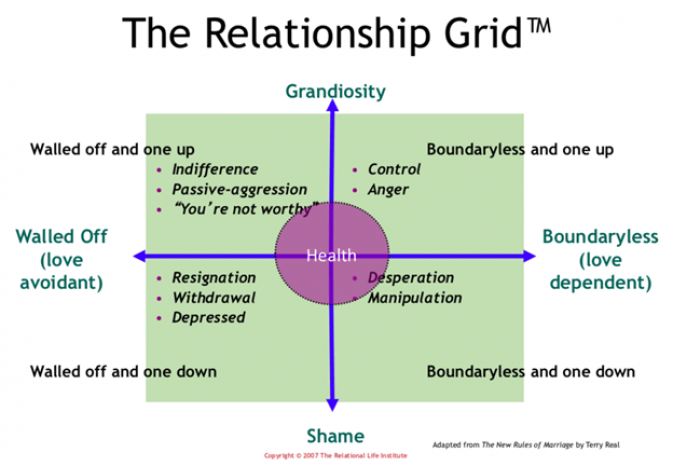
Do you find that your relationships are affected by poor boundaries and self-esteem? Or do you perhaps have too many boundaries and too much self-esteem? No matter where you land, we want to avoid these extremes, as they cause problems when we try to form mutually beneficial relationships.
To help us understand relationship patterns and behaviors, we'll outline The Relationship Grid, developed by therapist Terry Real, which is a useful way to conceptualize where your primary maladaptive relationship style trends.
In this model, the horizontal axis represents boundaries and the vertical axis represents self-esteem.

Grandiosity vs Shame
Let’s start with the vertical axis, which measures self-esteem.
The top of the axis is grandiosity, or “one up,” and the bottom is toxic shame, or “one down.” Shame and grandiosity are not opposite emotions. Instead, they are the same emotion pointed in opposite directions.
When the focus is outward, we will show contempt towards others. The grandiose person feels superior, better than, godlike, and sees themself as worth more than another person or group of people. You are being grandiose whenever you look down your nose at someone.
Grandiosity means regarding someone judgmentally, not by their actions, but by character-based judgements (e.g. calling someone a moron, disgusting). You may also see grandiose people use cuss words to describe people or engage in offensive slurs for various groups of people. Grandiosity can also give a person a sense of entitlement or the feeling that they are above the law.
Toxic shame is when this contempt is pointed inward. As opposed to appropriate shame, which is when it makes sense to feel bad about something based on your actions, toxic shame is how we make ourselves feel less than.
In many ways, we can treat ourselves like we are disgusting or unfit to be around other humans. Many of the things that a grandiose person would say to others, a person filled with toxic shame will say to themselves. When we are filled with toxic shame, we see ourselves as inherently flawed and defective. We believe that we are worthless and that our needs are always secondary to everything else.
In essence, you have too much shame if you land on the toxic shame side of things and too little shame if you land on the grandiose area.
Boundaryless vs Walled Off
On the horizontal axis or the boundary line, we have "walled off" and" boundaryless."
As Terry Real writes, “When you are boundaryless, you are connected but not protected. When you are behind a wall,...
Keep reading on Quick and Dirty Tips
Tidak ada komentar:
Posting Komentar